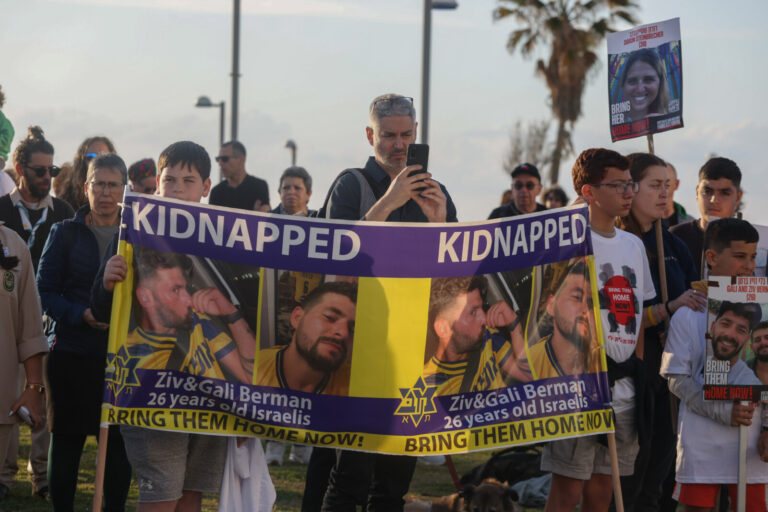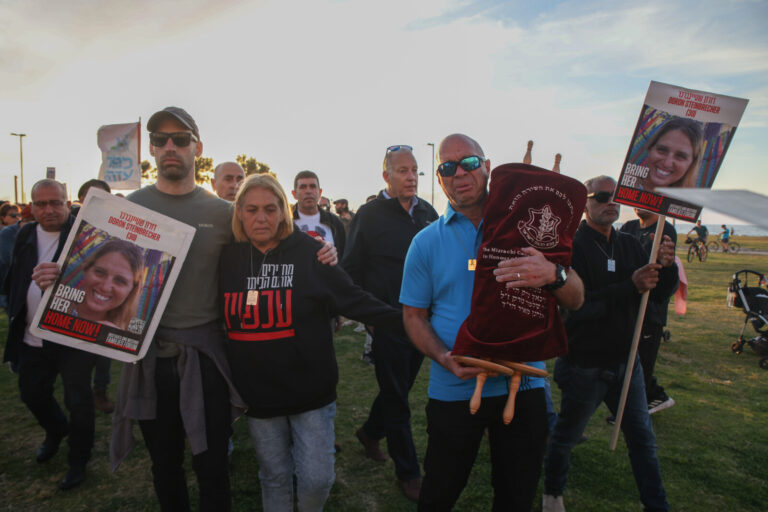
Throughout the country, Israelis are celebrating the Purim season by dressing up in costume, exchanging gift baskets, and telling the holiday story. Last week, though, members of the Kfar Aza kibbutz gathered in Tel Aviv to erect a sukkah, the traditional hut that Jews build every fall during the week-long holiday of Sukkot, which falls in September and October. Kfar Aza members used the gathering to symbolize that their community is still dealing with the aftermath of the Oct. 7 attack, which fell on Simchat Torah, the last day of Sukkot. More than 60 members of Kfar Aza’s 700-person community were murdered on Oct. 7 and 19 were kidnapped to Gaza.
Kfar Aza members used the event to call for the immediate release of the five hostages from the Kibbutz who remain in captivity. Of the 19 who were kidnapped, 12 were released, two were killed by Israeli forces, and five remain in Hamas captivity.

“From the perspective of the community members, the event is still at its peak until all the captives return, and therefore we decided to erect a sukkah, symbolizing the fact that in our feelings, we are still deeply in Simchat Torah and have not left the state of mourning,” the community members announced ahead of the event.
Yamit Ashkenazi, the sister of Doron Steinbrecher, who is still held in Gaza, spoke at the event. “On Nov. 9, I stood here and we held an optimistic event, ‘The Lantern of Hope.’ Since then, two of our friends were killed. They returned … and five remain, missing and beloved so much by us.”
She noted that her sister Doron was turning 31 that week while in captivity. “I didn't think we would mark her birthday without her,” she said. “We are still stuck in Simchat Torah and therefore we chose to erect a sukkah here. None of us have left the mourning. None of us are out of the woods. Our community has lost 64 loved ones, taken from us. It’s heartbreaking. I’m begging—return our sons and daughters to us. We cannot go back to our lives without them. There is no hope and no future as long as they are still there.”
Shira Mark, the sister of Pdaya Mark, a soldier who fought off terrorists in Kfar Aza and later fell in Gaza, also spoke at the event.
“On Oct. 8, my beloved uncle Elhanan Clemanzon saved people in Be’eri and fell there. Pdaya and his team fought for two days in Kfar Aza and then he entered Gaza and was killed in the disaster. We brought a Torah scroll in their memory to Kfar Aza. Time stands still, and we cannot heal or move on until the captives are home, and until we win the war of light against this darkness,” she said.

“We are all stuck in time,” she continued. “The feelings are of an event that never ends. But even now we are here—bringing spirit and strength, God knows from where, bringing light. A Torah scroll is something that unites us. Every letter in it is important, a part of the whole. And we are the same, and with so many missing letters. We need to fight shoulder to shoulder to bring them home. We are all stuck on Oct. 7. Stuck and still moving. Stuck and still moving.”
Kfar Aza community manager Tzion Regev addressed the crowd as well. “I arrived at the kibbutz five months ago,” he said. “I didn’t know Kfar Aza or the captives. But since then, every day and moment I am with you, the images of the five captives are before our eyes.”
“The meetings with the families are wrenching,” he said. “We must do everything, and now. Before anything else. Anyone who doesn’t understand should come and meet the families. With a hundred exclamation marks. Our duty is to ask ourselves every day, each one of us, what have we done today to promote their return. A post, an interview, an article, reaching out to public figures. Every day.”
Yossi Keren, the head of Sha'ar HaNegev Regional Council, in which Kfar Aza is located, spoke on behalf of the council.
“The entire Israeli society and Sha’ar HaNegev in particular cannot go back and thrive without the return of the captives,” he said. “We are all mobilized for and on behalf of the families. We call on all decision makers to fulfill their moral obligation toward us. We have no hope or routine without the captives, even if schools reopen. Without them, we will not be whole. Our cry is not political, and I ask the public to respect the families’ request. It’s a human cry that pierces hearts. We will not give up until you return home.”
At the end of the event, a memorial prayer was held, along with a traditional dance around the Torah scroll, as is performed on Simchat Torah.






